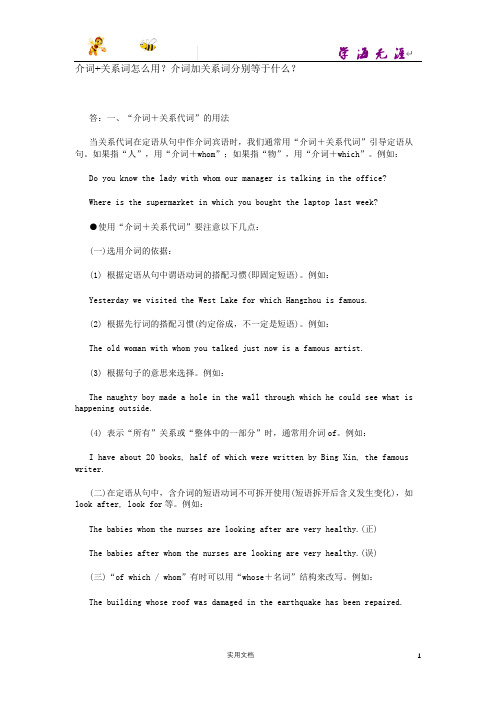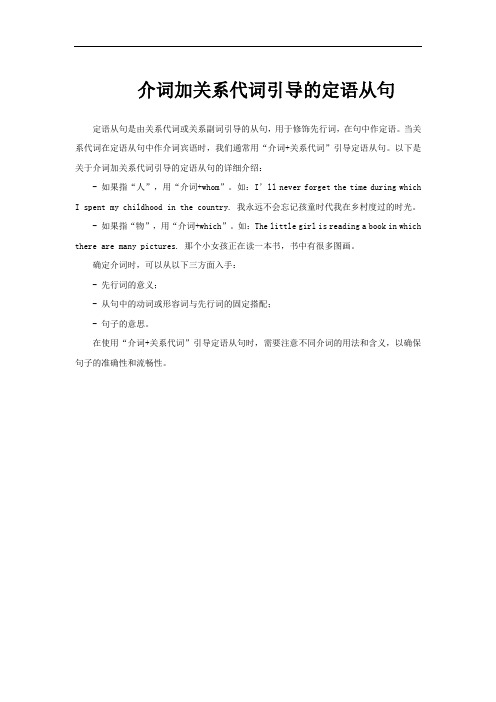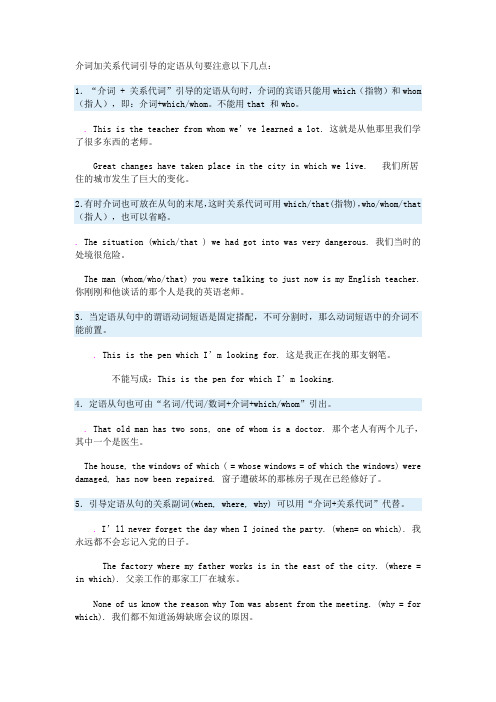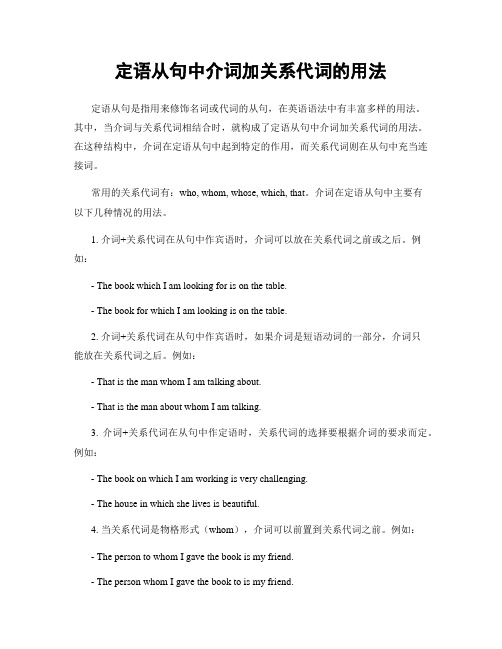定语从句介词加关系词
定语从句 知识讲解 “介词+关系代词”的用法

介词+关系词怎么用?介词加关系词分别等于什么?答:一、“介词+关系代词”的用法当关系代词在定语从句中作介词宾语时,我们通常用“介词+关系代词”引导定语从句。
如果指“人”,用“介词+whom”;如果指“物”,用“介词+which”。
例如:Do you know the lady with whom our manager is talking in the office?Where is the supermarket in which you bought the laptop last week?●使用“介词+关系代词”要注意以下几点:(一)选用介词的依据:(1) 根据定语从句中谓语动词的搭配习惯(即固定短语)。
例如:Yesterday we visited the West Lake for which Hangzhou is famous.(2) 根据先行词的搭配习惯(约定俗成,不一定是短语)。
例如:The old woman with whom you talked just now is a famous artist.(3) 根据句子的意思来选择。
例如:The naughty boy made a hole in the wall through which he could see what is happening outside.(4) 表示“所有”关系或“整体中的一部分”时,通常用介词of。
例如:I have about 20 books, half of which were written by Bing Xin, the famous writer.(二)在定语从句中,含介词的短语动词不可拆开使用(短语拆开后含义发生变化),如look after, look for等。
例如:The babies whom the nurses are looking after are very healthy.(正)The babies after whom the nurses are looking are very healthy.(误)(三)“of which / whom”有时可以用“whose+名词”结构来改写。
定语从句中介词+关系词

“介词+关系词”的用法1、关系代词在从句中作介词的宾语时,介词常可以提前,但介词提前时,关系代词只能用which 或whom.如:The school (that/which) he once studied in is very famous.→The school in which he once studied is very famous。
Tomorrow I will bring here a magazine (that/which)you asked for.→Tomorrow I will bring here a magazine for which you asked。
We’ll go to hear the famous singer (whom/that/who)we have often talked about。
→We’ll go to hear the famous singer about whom we have often talked.2、关系副词when, where, why 和介词+which之间的关系。
关系副词when, where,why可以用适当的介词+which来替代。
介词的位置非常灵活,有时放在关系代词之前,有时放在动词之后。
如:when=in/on/at…+which, where=in/on/at…+which, why=for+which 如:I won’t forget the date when( on which)I was born.This is the room where (in which) I lived. = This is the room which I lived in.I don’t know the reason why (for which) he hasn’t come today.Tom still remembers the days when (in which)they lived in Tianjin。
介词加关系代词引导的定语从句

介词加关系代词引导的定语从句
定语从句是由关系代词或关系副词引导的从句,用于修饰先行词,在句中作定语。
当关系代词在定语从句中作介词宾语时,我们通常用“介词+关系代词”引导定语从句。
以下是关于介词加关系代词引导的定语从句的详细介绍:
- 如果指“人”,用“介词+whom”。
如:I’ll never forget the time during which I spent my childhood in the country. 我永远不会忘记孩童时代我在乡村度过的时光。
- 如果指“物”,用“介词+which”。
如:The little girl is reading a book in which there are many pictures. 那个小女孩正在读一本书,书中有很多图画。
确定介词时,可以从以下三方面入手:
- 先行词的意义;
- 从句中的动词或形容词与先行词的固定搭配;
- 句子的意思。
在使用“介词+关系代词”引导定语从句时,需要注意不同介词的用法和含义,以确保句子的准确性和流畅性。
定语从句介词加关系代词用法

定语从句介词加关系代词用法在定语从句中,介词加关系代词的用法如下:1.关系代词在介词前:当关系代词作为定语从句的主语时,介词通常放在关系代词的前面。
例如:- The man whom I spoke to is my boss.(我与之交谈的那个人是我的老板。
)- The book that I am looking for is on the table.(我要找的那本书在桌子上。
)2.关系代词在介词后:当关系代词作为定语从句的宾语时,介词通常放在关系代词的后面。
例如:- The house which he lives in is very old.(他住在的那栋房子很旧。
)- The car that she is interested in is not available.(她感兴趣的那辆车不可用。
)需要注意的是,当介词后的关系代词是which时,可以省略介词。
例如:- The city which I was born in is famous for its architecture.(我出生的那座城市以其建筑而闻名。
)- The city I was born in is famous for its architecture.(我出生的那座城市以其建筑而闻名。
)同时,也可以通过适当拓展定语从句来提供更多信息:- The man whom I spoke to yesterday, in the cafe near my office, is my boss.(昨天我在我办公室附近的咖啡馆里与之交谈的那个人是我的老板。
)- The book that I am looking for, which is a bestseller,is on the table.(我正在找的那本畅销书就在桌子上。
)。
介词+关系词引导的定语从句

介词加关系代词引导的定语从句要注意以下几点:1.“介词 + 关系代词”引导的定语从句时,介词的宾语只能用which(指物)和whom (指人),即:介词+which/whom。
不能用that 和who。
.This is the teacher from whom we’ve learned a lot. 这就是从他那里我们学了很多东西的老师。
Great changes have taken place in the city in which we live. 我们所居住的城市发生了巨大的变化。
2.有时介词也可放在从句的末尾,这时关系代词可用which/that(指物),who/whom/that (指人),也可以省略。
. The situation (which/that ) we had got into was very dangerous. 我们当时的处境很危险。
The man (whom/who/that) you were talking to just now is my English teacher. 你刚刚和他谈话的那个人是我的英语老师。
3.当定语从句中的谓语动词短语是固定搭配,不可分割时,那么动词短语中的介词不能前置。
.This is the pen which I’m looking for. 这是我正在找的那支钢笔。
不能写成:This is the pen for which I’m looking.4.定语从句也可由“名词/代词/数词+介词+which/whom”引出。
. That old man has two sons, one of whom is a doctor. 那个老人有两个儿子,其中一个是医生。
The house, the windows of which ( = whose windows = of which the windows) were damaged, has now been repaired. 窗子遭破坏的那栋房子现在已经修好了。
定语从句 介词加关系词

“介词+ which / whom”引导的定语从句1,“介词+关系代词”引导的定语从句,是定语从句一种介词前置的定语从句句型,介词与关系代词之间存在一种介宾关系。
当关系代词在定语从句中作介词宾语时,把介词置于关系代词前,即演变出“介词+关系代词”句型。
2.关系词:引导定语从句的关联词称为关系词,关系词有关系代词和关系副词。
关系代词有that, which, who, whom, whose, as等;关系副词有where, when, why等。
3. whose通常指人,也可指物,在定语从句中做定语(1) He has a friend whose father is a doctor.(2) I once lived in a house whose roof has fallen in.(3) The classroom whose door is broken will soon be repaired.一、基本构成1.“介词+关系代词”结构引导的定语从句中,关系代词只能用which(指物)或whom(指人) ,即:介词+which/whom。
(1)The man to whom you spoke is a teacher.(2)The city in which she lives is far away.(3)The little girl is reading a book,in which there are many cartoons.注意:当介词放在关系代词的前面时,用在介词后的关系代词不能省略。
2.在定语从句中,当介词置于定语从句的谓语动词之后时,可用that/which(指物);that/who/whom(指人)作介词的宾语.且此处关系代词可以省略。
如:(1) The man (who/whom /that )you spoke to is a teacher.(2)The city(which/that)she lives in is far away.注:通常介词放在定语从句中动词后,也可以放在关系代词前面,但有些特殊动词短语搭配不能拆分,介词只能放在动词后,如: look for, look after, pay attention to ,take care of , look forward to, listen to等。
定语从句中介词加关系代词的用法

定语从句中介词加关系代词的用法定语从句是指用来修饰名词或代词的从句,在英语语法中有丰富多样的用法。
其中,当介词与关系代词相结合时,就构成了定语从句中介词加关系代词的用法。
在这种结构中,介词在定语从句中起到特定的作用,而关系代词则在从句中充当连接词。
常用的关系代词有:who, whom, whose, which, that。
介词在定语从句中主要有以下几种情况的用法。
1. 介词+关系代词在从句中作宾语时,介词可以放在关系代词之前或之后。
例如:- The book which I am looking for is on the table.- The book for which I am looking is on the table.2. 介词+关系代词在从句中作宾语时,如果介词是短语动词的一部分,介词只能放在关系代词之后。
例如:- That is the man whom I am talking about.- That is the man about whom I am talking.3. 介词+关系代词在从句中作定语时,关系代词的选择要根据介词的要求而定。
例如:- The book on which I am working is very challenging.- The house in which she lives is beautiful.4. 当关系代词是物格形式(whom),介词可以前置到关系代词之前。
例如:- The person to whom I gave the book is my friend.- The person whom I gave the book to is my friend.需要注意的是,在口语中,人们往往更倾向于使用介词后置的形式,即将介词放在关系代词后面。
同时,有时候可以使用介词+which来替代介词+关系代词的结构,这种形式更加简洁。
介词加关系代词例句

介词加关系代词例句在介词加关系代词的语法规则中,常见的有以下几种情况。
1. 在定语从句中,介词加关系代词可以表示时间、地点、原因或目的等。
例如:I still remember the day on which we met for the first time.(我仍然记得我们第一次见面的那一天。
)The house in which he lives is very big.(他住的房子很大。
)That is the reason why he refused to help us.(那就是他拒绝帮助我们的原因。
)We need to find a way by which we can solve this problem.(我们需要找到一种方法来解决这个问题。
)2. 在介词宾语从句中,介词加关系代词可以表示原因、结果或条件等。
例如:He is confident of the fact that he will pass the exam.(他相信他会通过考试这个事实。
)I am worried about the possibility that he might not come.(我担心他可能不会来的可能性。
)She is happy with the news that she got the promotion.(她对她得到晋升的消息感到高兴。
)3. 在介词短语中,介词加关系代词可表示修饰名词的关系,常用于介词+which结构。
例如:I'm interested in the book with which you're studying.(我对你正在学习的那本书很感兴趣。
)The game about which they are talking is very exciting.(他们正在谈论的游戏非常令人兴奋。
)4. 在介词对等结构中,介词加关系代词可以构成介词对等从句。
- 1、下载文档前请自行甄别文档内容的完整性,平台不提供额外的编辑、内容补充、找答案等附加服务。
- 2、"仅部分预览"的文档,不可在线预览部分如存在完整性等问题,可反馈申请退款(可完整预览的文档不适用该条件!)。
- 3、如文档侵犯您的权益,请联系客服反馈,我们会尽快为您处理(人工客服工作时间:9:00-18:30)。
“介词+ which / whom ”引导的定语从句1. 介词+关系代词”引导的定语从句,是定语从句一种介词前置的定语从句句型,介词与关系代词之间存在一种介宾关系。
当关系代词在定语从句中作介词宾语时,把介词置于关系代词前,即演变出介词+关系代词”句型。
2. 关系词:引导定语从句的关联词称为关系词,关系词有关系代词和关系副词。
关系代词有 that, which, who, whom, whose, as 等;关系畐U词有 where, when, why 等。
3. whose通常指人,也可指物,在定语从句中做定语(1) He has a friend whose father is a doctor.(2) I once lived in a house whose roof has fallen in.(3) The classroom whose door is broken will soon be repaired.一、基本构成1. 介词+关系代词”结构引导的定语从句中,关系代词只能用which (指物)或whom(指人),即:介词 +which/whom 。
(1)The man to whom you spoke is a teacher.(2)The city in which she lives is far away.(3)The little girl is reading a book ,in which there are many cartoons.注意:当介词放在关系代词的前面时,用在介词后的关系代词不能省略。
2. 在定语从句中,当介词置于定语从句的谓语动词之后时,可用that/which(指物);that/who/whom (指人)作介词的宾语.且此处关系代词可以省略。
如:(1)The man (who/whom /that ) you spoke to is a teacher.(2)The city (which/that ) she lives in is far away.注:通常介词放在定语从句中动词后,也可以放在关系代词前面,但有些特殊动词短语搭配不能拆分,介词只能放在动词后,女口: look for, look after, pay atte ntion to ,take care of ,look forward to, liste n to 等。
This is the pen (that / which) you are look ing for.The patient ( who/whom /that ) she is looking after is her father.The words( that /which) we should pay attention to are written on the blackboard.There are fifty patients (who/whom/that )we must take good care of.练习: Are these sentences right?(1) The man with whom you talked is my friend.(2) The man( who/that) you talked with is my frie nd.(3) The man with who/that you talked is my friend.(4) The pla ne in which we flew to Can ada is very comfortable.(5) The plane in that we flew to Canada is very comfortable.⑹二、关系副词 when , where , why引导的定语从句。
可用介词+ which "来代替。
关系副词实际上是介词+先行词。
其中 when=表时间的介词(如:in, at,during等)+which ;where=表地点的介词(如: in, at,on,under 等) +which ;why=表原因的介词(如: for)+which(1)当先行词表示时间,定语从句中缺少时间状语时,通常用关系副词 whe n引导,此时也可选用表示时间的介词+ which来代替关系副词 when。
例如: I still remember the day when I came here. ( on the day =when)⑵当先行词表示地点,定语从句中缺少地点状语时,通常用关系副词 where引导,此时也可选用表示地点的介词+ which来代替关系副词 where。
例如: This is the house where I lived last year. ( in the house= where)⑶当先行词为reason,定语从句中缺少表示原因状语时,通常用关系副词 why引导,此时也可以用for which来代替关系副词why。
例如: There are many reasons why people like traveling. (for the reasons =why)三、关系代词前介词选择三原则:一先,二动,三意义(重中之重)1. 一先,即根据定语从句中介词与先行词的搭配关系选择。
I never forget the day on which I came to this school. (on the day)2. 二动,即根据定语从句中谓语动词与介词的搭配关系选择。
This is the iPad on which I spent 3000 yuan. (spend money on sth.)3. 三意义,即根据定语从句的意义来确定介词。
This is my pair of glasses, without which_ I cannot see clearly.例题:用介词+关系代词”的形式表示1. Do you like the book ________ she lear ned a lot?2. He paid the boy $10 for wash ing ten win dows, most _had n't bee n clea ned for at least a year.3. The tower _________ p eople can have a good view is on the hill.注意:介词+关系代词1) 介词后面的关系代词不能省略。
2) that前不能有介词。
3 )某些在从句中充当时间,地点或原因状语的”介词+关系词”结构可以同关系副词when,where 禾口 why 互换。
定语从句练习:I.The place ______ in terested me most was the Childre n's Palace.A. WhichB. whereC. whatD. in which2.Do you know the man ?A. whom I spokeB. to who spokeC. I spoke toD. that I spoke3.This is the hotel last mon th.A. which they stayedB. at that they stayedC. where they stayed atD. where they stayed4. Do you know the year __ the Chin ese Communist Party was foun ded?A. whichB. thatC. whenD. on which5. The factory ___ we'll visit n ext week is not far from here.A. whereB. to whichC. whichD. i n which6. Ca n you lend me the book ____ the other day?A. about which you talkedB. which you talkedC. about that you talkedD. that you talked7. The pen ____ he is writ ing is mine.A. with whichB. i n whichC. on whichD. by which8. They arrived at a farmhouse, in front of sat a small boy.A. whomB. whoC. whichD. that9. The engin eer ___ my father works is about 50 years old.A. to whomB. on whomC. with whichD. with whom10.lt there anyone in your class _ family is in the country?A. whoB. who'sC. whichD. whose11.1'm in terested in _ you have said.A. all thatB. all whatC. thatD. which12.1 want to use the same dictwas used yesterday.ionaryA. whichB. whoC. whatD. as13.Li Ming, to the concert enjo yed it verymuch.A. I went withB. with whom Iwith who I went D.l went with himwentC14.He talked a lot about things and persons they remembered in the school. A. which B. that C. whom D. what15.This is the reas on __ he did n't come to the meet ing.A. in whichB. with whichC. thatD. for which状语从句练习1. _______ he ' old, he can still carry this heavy bag. A. Though B. Since C. For D. So2. Do you know if he______ to play basket ball with us?---I thi nk he will come if he free tomorrow. A. comes; is B. comes; will be C. will come; is D. will come; will be 3. The police asked the childre ncross the street the traffic lights turned green. A. not; before B. don ' when C. not to; until D. not; after4.1 was late for class yesterday ____ there was something wrong with my bike.A. whe nB. thatC. un tilD. because5. I hurried I would n 'tbe late forclass.A. sinceB. so thatC. as ifD. uni ess6. The teacher raised his voice all the stude nts could hear him.A. forB. so thatC. becauseD. in order7. t is that we ' like to go out for a walk.8. Mary had much work to do that she stayed at her office allday.A . such B. so C. too D. very17. _______ I felt very tired, I tried to finish the work.A. AlthoughB. BecauseC. AsD. As if18. ____ the day went on, the weather got worse.A. WithB. SinceC. WhileD. As19. _____ well you can drive, you must drive carefully.A. So long asB. I n order thatC. No matter howD. The mome nt20. Write to me as soon as you _______ to Beijing.A. will getB. getC. getti ngD. got21It was raining ___ I arrived at the stati on.A.asB.whileC.whe nD.as soon as22. They were play ing on the computer ________ their teacher came in .A.afterB.whe nC.u ntilD.then23. My wife was wach ing TV while I __ on the Intern et.A.seachB.was seach ingC.seachedD.seach ing24.I 'll let you know Mary comes back.A.so soonB.un tilC.as soon asD.while25.lt __ heavily whe n I left the cin ema.A.rai nsB.will rainC.is rai ningD.was rai ning26.Ma ny stude nts did n 'realize the importa nee of study they left school. A.whe n B.u ntil C.as D.afterWelcome To Download !!!欢迎您的下载,资料仅供参考!。
